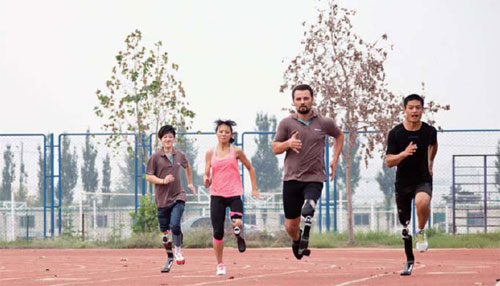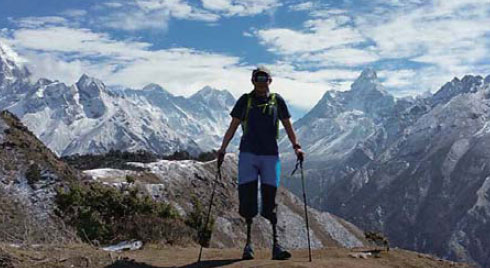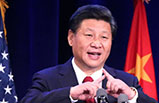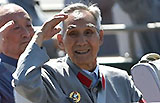Ottobock promotes spirit of Paralympics
By Wang Xiaodong (China Daily) Updated: 2015-10-29 08:13
Prosthetics supplier gives athletes technology, skills to improve mobility
The name Ottobock stands for high-quality and technologically outstanding products and services in medical technology around the world. The goal of helping to restore mobility for people with disabilities, and protect what mobility they have, stands behind each and every product the company makes, a senior executive said.
Ralf Stuch, executive vice-president of Ottobock HealthCare and president of Ottobock Asia Pacific Region, said the conviction that quality of life is closely associated with a maximum of individual freedom and independence is a key concept that has been a major influence throughout the company's nearly 100-year history and guides the development of new products in a focused manner.
The global activities of the company are coordinated from its head office in Duderstadt, Germany. A network of distribution and service companies in more than 50 countries gives the company a global presence that places it near its customers.
With its four divisions of Prosthetics, Orthotics, Mobility Solutions with a focus on manual and power wheelchairs and rehab products, and Medical Care, the company is ideally positioned and capable of offering its customers a wide range of products, harmonized system solutions and extensive services, Stuch said.
Ottobock's commitment to sports for the disabled has long been a fixture of the company's philosophy. The goal is to place people with disabilities at the center of society and to show them as great athletes and role models, demonstrating that sports and performance can restore their confidence about life, Stuch said.
This spirit is embodied by the Paralympic Games, which Ottobock has actively backed and supported since the Paralympics in Seoul in 1988. At the London Paralympics in 2012, the Ottobock team, consisting of 78 orthopedic technicians from 20 countries, worked on 2,080 repair orders.
Ottobock has been a cooperation partner of the International Paralympic Committee since 2005, and in London extended this contract through Rio 2016.
Ottobock China, a wholly owned enterprise that was founded in 1993, has been providing state-of-the-art products and services to people with mobility needs in China for more than two decades. It is also committed to improving the welfare of those with mobility difficulties and promoting the spirit of the Paralympics in China, Stuch said, organizing various events in recent years.
"Ottobock is committed to enabling people with disability regain their freedom of movement to improve their independence and quality of life," he said.
In the past century, Ottobock's dedication to improving the life quality of people with mobility needs through innovation has benefited many people, including reigning Paralympics and world champion sprinter Heinrich Popow and renowned Chinese mountain climber Xia Boyu.
Running clinics
In September 2014, Ottobock China cooperated with the Henan Disabled Persons' Federation to hold a three-day clinic for amputees.
The running clinic, coached by Popow, the 2012 Paralympics and 2011 and 2013 world champion in the T42 100 meters, gave amputees the skills to regain their freedom of movement to improve their independence and quality of life.
Participants included beginners as well as experienced runners, such as Li Maoda, national male champion in the T42 200 meters; and Chen Yimei, national female champion in the T42 100 meters. Both were looking for tips to improve their techniques and competitiveness.
Ottobock Running Clinics are organized worldwide. They offer participants the opportunity to trial the latest technology in sports prosthesis, the Ottobock 3S80 and sprinter foot, under the expert tuition of Popow.
In this unique format, all levels of runners work together, learning the specific techniques of running on a prosthesis, from taking their first steps to practicing training drills until they are running with confidence, inspiring and supporting each other to reach their personal goals.
Some of the participants want to regain their active lifestyles and others are eager to learn from Popow with the hope of reaching finals in the Paralympics in Rio in 2016.
"Whether it is to simply enjoy sports with their children or follow a dream to compete in the Paralympic Games, it is critical that anyone learning to run on a prosthesis has their equipment set up properly and is taught the right techniques," said Ottobock ambassador Popow.
"Teaching people to run for the first time and seeing the joy it brings to them and their families means as much to me as competing in the Paralympic Games."
Stuch said, "With the rise in popularity of the Paralympic Games, we are seeing a significant interest in people looking to become more active and try new sports.
"For many people, an active lifestyle is an important part of this and the 3S80 running knee joint makes this possible for more amputees than ever before. It is ideal for running on the treadmill as well as a variety of outdoor environments, including the pavement, beach and trails and can be used for other sports that involve running."
Staying true to his dream
Xia, who is now 64, was only 248 meters away from the top of Qomolangma, known as Mount Everest in the West, when he climbed the world's top peak in 1975. He had to give up after being trapped with his team at a height of 8,600 meters for two days and three nights due to a violent storm.
During their retreat down the mountain, Xia suffered severe frostbite in both feet and they later had to be amputated. Loss of his feet almost put an end to his dream of reaching the peak of the world.
However, that dream become a possibility again with the artificial limbs that Ottobock custom-made for Xia.
Although he lost his feet at a young age, Xia did not allow himself to be devastated by the loss. For the past 30 years, he kept up strenuous physical training so he could pursue his dreams, including climbing Qomolangma.
"As long as I live, I will strive to realize my dream," he said.
Model contest
Between July and September, Ottobock China organized a nationwide contest to select models who are amputees.
The event aimed to inspire more people with limited mobility to pursue their dreams, and encourage them to choose the best products to improve their quality of life.
The 12 finalists were awarded Ottobock's latest products, such as the Puro line knee joint. Many of the participants had become disabled due to various causes such as disease or car accidents but the confidence and optimism they displayed was inspiring.
For the past century, Ottobock has been dedicated to providing the best products and services for those with limited mobility through combining its rich experience and the latest technology, the company said.
The number of people benefiting from Ottobock products, which are expected to help them live a more positive and active life, is increasing, according to the company.
wangxiaodong@chinadaily.com.cn
|
Heinrich Popow (second from right), Paralympics champion, exercises with participants of a three-day clinic for amputees using Ottobock products. Provided to China Daily |
|
Xia Boyu, an accomplished mountain climber, continues to enjoy his sport. Provided to China Daily |
(China Daily 10/29/2015 page15)








